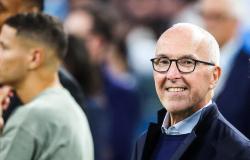Bob Hartley was never one to hide and not tell the truth.
His recent statement on the state of the Montreal Canadiens is striking proof of this. During a television segment on RDS, the former Stanley Cup champion coach launched a direct arrow at Martin St-Louis and his team:
“We can unplug the mixer…we won’t be in the mix!” »
“There is not enough in the bowl. To have a mix, you may need different ingredients. There are not enough ingredients.”
This is not the first time that Bob Hartley’s name has been linked to that of the Canadian. According to persistent rumors, Hartley recently offered his services to Martin St-Louis in a special advisor role.
This offer would have been politely but firmly rejected by the Canadian head coach.
The former Stanley Cup champion coach with the Colorado Avalanche, known for his discipline and structure, was indeed snubbed by Martin St-Louis, obsessive protector of his authority.
This refusal has become the symbol of structural problems and shortcomings in the management of the team…or rather in the management of this Country Club.
This refusal also clearly fueled merciless criticism from Hartley, who now seems determined to point the finger at St-Louis.
“It’s not serious that we want to be in the mix. If someone tells us that we want to replace Dach because we are counting on Da k for future years, perfect, I’m a buyer.”
“But on the other hand, while we’re being told that about Dach, why isn’t Hutson on the first power play?
“Because Matheson, when the Canadian is going to be really competitive, Mike Matheson will no longer be with the Canadian.”
Hartley talks to St. Louis like he’s his teacher. Not for nothing did he want to become her advisor.
Hartley, who resides comfortably in Florida, would have liked to play a role similar to that of Vincent Lecavalier, already special advisor to Kent Hughes.
This position, often referred to as a “country club,” allows Lecavalier to stay in Florida and juggle his professional obligations and personal activities, such as following his children in their respective sports.
The example of Vincent Lecavalier, special advisor and close friend of St-Louis, leaves fans and analysts scratching their heads.
While Lecavalier juggles his daughters’ golf tournaments with his son’s hockey practices in Florida, his actual contributions to the Canadian remain unclear.
The description of his tasks? Analyzing players sporadically, often remotely, and an endless list of “any other related tasks.”
This remote management, where involvement seems symbolic, amplifies the idea of a “Country Club” within the CH, where positions are granted based on connections rather than real needs.
The idea of such an arrangement for Hartley creates a mixture of curiosity and outrage.
Many wonder if this remote role, often perceived as symbolic, would have a real impact on the team or if it would reinforce the image of a Montreal Canadiens where friends give each other jobs with a simple handshake, name of friendship.
While Lecavalier occupies a remote position without real pressure, Hartley, who could have offered live expertise, was sidelined by St-Louis.
He still refuses to expand his coaching staff with experienced figures. The fear of losing authority seems to take precedence over the good of the team. To the point of refusing Hartley, even as an advisor.
St-Louis remains committed to its vision. He chooses to remain sole master on board, at the risk of letting the ship drift.
In this context, Bob Hartley’s profile takes on its full meaning. As a coach, Hartley has always advocated rigor, discipline and an unwavering work ethic, elements that are sorely lacking in the current Canadian.
Unlike St-Louis, he would not have hesitated to make tactical changes and make the players responsible.
His Stanley Cup experience, his ability to motivate his teams and his well-established defensive structure could have given a new lease of life to a team in difficulty.
But once again, St. Louis’ ego seems to have taken precedence over the team’s needs.
If Hartley was not integrated into the coaching staff, this can be explained in part by the protection that St-Louis still enjoys from Geoff Molson and the fans.
Still, the idea of welcoming Hartley into a comfortable role in Florida would once again have strengthened the image of the Country Club.
If Hartley had been hired, it would have accentuated the perception that the CH has become a refuge for well-connected figures, taking advantage of lucrative positions without real daily commitment.
This criticism, already present in the case of Lecavalier, finds a new echo with Hartley. Even if the latter did not obtain the coveted position, his arrows against St-Louis show that it would have been difficult for the two men to collaborate, as their approaches seemed incompatible.
In the end, Hartley, known for his outspokenness, not only threw Martin St-Louis under the bus, but he also shed light on the ongoing tensions and challenges within the Canadiens.
As St-Louis tries to turn things around in a difficult context, criticisms like those from Hartley will only fuel doubts about its management and strategic choices.
As for Hartley, his dream of joining the CH organization in relaxation mode under the Florida sun may have to wait, unless Geoff Molson decides once again to give in to the temptation of a “fat” position. hard” for the great figures of hockey.
Welcome to the Montreal Canadiens Country Club. The kingdom of fake jobs under the sun.





